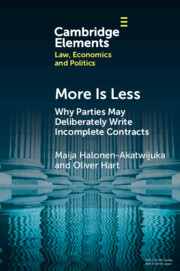More is Less
Why are contracts incomplete? Transaction costs and bounded rationality cannot be a total explanation since states of the world are often describable, foreseeable, and yet are not mentioned in a contract. Asymmetric information theories also have limitations. We offer an explanation based on 'contracts as reference points'. Including a contingency of the form, 'The buyer will require a good in event E', has a benefit and a cost. The benefit is that if E occurs there is less to argue about; the cost is that the additional reference point provided by the outcome in E can hinder (re)negotiation in states outside E. We show that if parties agree about a reasonable division of surplus, an incomplete contract is strictly superior to a contingent contract. If parties have different views about the division of surplus, an incomplete contract can be superior if including a contingency would lead to divergent reference points.
Product details
May 2024Paperback
9781009396073
34 pages
228 × 151 × 3 mm
0.07kg
Available
Table of Contents
- 1. Introduction
- 2. The model
- 3. Is more less?
- 4. Large gains in event
- 5. Summary and conclusions
- Appendix
- References.




